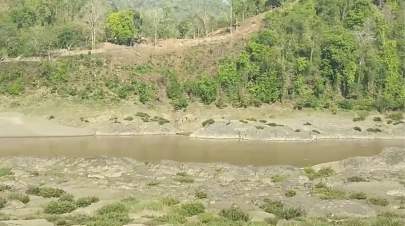Myanmar junta says rockets fired at 2 air bases; no injuries

Rockets were fired at two Myanmar government air bases on Thursday, causing minor damage but no injuries, the military junta said. The attacks are the latest sign that as the junta attempts to control widespread protests in cities against its February seizure of power, it is facing new military challenges in other areas.
No group claimed responsibility for the attacks on the bases in Magway and Meiktila in central Myanmar, and the government said it is seeking those responsible.
Capt. Aye Thazin Myint, a junta spokeswoman, said at a news conference in the capital, Naypyitaw, that four 107mm rockets were fired at the air force base in Magway at 3 a.m. Thursday, with three landing in a field and one on a road. She said one building was slightly damaged in the attack, which the military determined originated from two nearby villages.
She said five rockets were fired between 5 a.m. and 9 a.m. at the air base in Meiktila, where gunfire was also heard from nearby villages.
The rockets are commonly used by insurgent groups because they are are cheap and easily deployed, although they are not particularly accurate.
The junta, which ousted the elected government of Aung San Suu Kyi in its Feb. 1 coup, is engaged in open warfare with guerrillas from the Kachin and Karen minorities which have allied themselves with the protest movement against military rule.
The Kachin, in northern Myanmar, and the Karen in the east have battled the central government for decades for greater autonomy, through periods of armed conflict and unsteady cease-fires. Both areas have experienced increased fighting in recent months and have been targeted by air strikes and ground attacks by government forces. The Karen on Tuesday captured a government base on the border with Thailand.
The military government has also stepped up its campaign against its opponents in cities, issuing arrest warrants for hundreds of activists including actors, internet influencers and doctors. Journalists have also been targeted.
Street protests are continuing but on a much smaller scale since the security forces stepped up their use of lethal force. More than 700 protesters and bystanders have been killed, according to several detailed tallies. The junta puts the figure at roughly one-third of that and says it used force appropriately to curb rioting.
The state-run Global New Light of Myanmar newspaper reported Thursday that an accused protest leader, Wai Moe Naing, was formally charged with offenses including murder and treason for allegedly heading a well-organized local network of resisters to military rule.
The detailed report, which could not be corroborated, suggests that even in a remote city, the movement against the junta was able to set up a sophisticated operation from scratch in just a few months with the ability to raise funds and link with allies. The report named dozens of alleged conspirators and displayed a chart illustrating their supposed connections.
Wai Moe Naing was arrested in the central city of Monywa on April 15 as he was taking part in a vehicle protest against the military’s takeover. He was captured when a car knocked down the motorbike on which he was riding.
He has not been seen publicly since his arrest, though the government released what it said was a photo of him, appearing bruised. Other photos of arrested protesters have shown them looking battered, leading to concern that they have been tortured.
Twenty-three suspects linked to Wai Moe Naing are being sought, the report said.
Photo: Provided by Associated Press In this image from video, a riverside Myanmar Army base, top left, seized by Karen guerrillas is seen from Mae Sam Laep, Thailand near the border with Myanmar Thursday, April 29, 2021. Myanmar government forces launched airstrikes against ethnic minority guerrillas in two areas of the country on Wednesday, local reports said. (UGC via AP)
Link: https://www.msn.com/en-us/news/world/myanmar-junta-says-rockets-fired-at-2-air-bases-no-injuries/ar-BB1gbiiu?ocid=Peregrine




